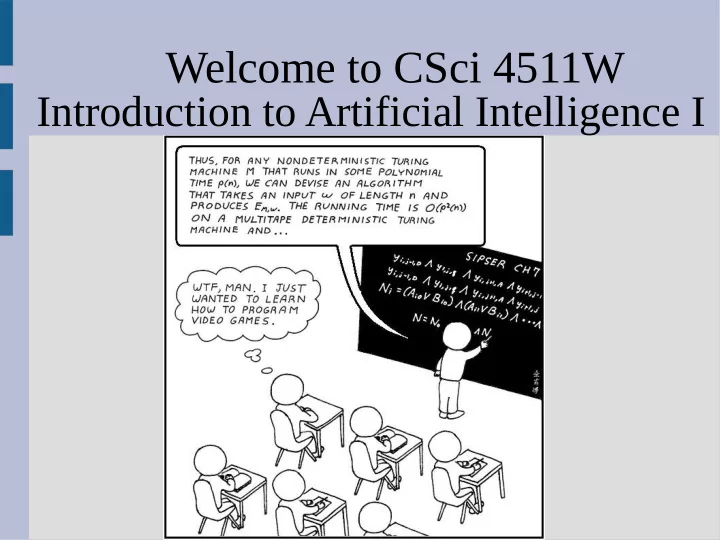

Welcome to CSci 4511W Introduction to Artificial Intelligence I
Instructor (me) James Parker Shepherd Laboratories 391 Primary contact: jparker@cs.umn.edu
Teaching Assistants Ojas Bhavani Narayanann, Shreyasi Pal, Arun Kumar
Textbook Artificial Intelligence A Modern Approach, Russel and Norvig, 3 rd edition
Class website www.cs.umn.edu/academics/classes Or google “umn.edu csci class” Syllabus, schedule, other goodies Canvas page will have grades and homework submission
Class website
Don't like my slides? (tough) http://aima.eecs.berkeley.edu/slides-pdf/
Prerequisites 1. Competent programmer and understand big-O 2. Understanding of data structures (graphs and trees) 3. Basic knowledge of formal logic (truth tables, boolean ops)
Syllabus 30% Homework (-15% per day late) 20% Writing assignments (-15% pdl) 15% Project 10% Midterm (Monday Feb. 24) 10% Midterm 2 (Monday April 6) 15% Final (Wednesday May 13, 1:30-3:30pm in this room) 3% Extra credit in-class activities
Homework Homework and written assignments are individual assessments (unless explicitly stated otherwise) Please ensure the work you turn in is your own
Writing assignments The writing assignments will use Latex (down with docx!) The first few will be reviews of related topics and the last couple will tie into the project These can be resubmitted within two weeks of being returned for another regrade (once)
Exams All exams are open book/notes (most people think they are hard) You can use an electronic device if you want on exams, but no: - phones - internet - running code (ish)
Syllabus Grading scale: 77% C+ 93% A 73% C 90% A- 70% C- 87% B+ 67% D+ 83% B 60% D 80% B- Below F
Schedule Week 1-4, Ch 1-4 - Intro & Search Week 5-6, Ch 5, 17.5 - Game playing Week 7-11, Ch 6-9 - Logic Week 12-14, Ch 10, 12 - Planning Week 15 - Special topics There will be one assignment (or exam) every week (first assignment due Feb. 3)
Project The project will be a large part of the class and should be about 10-12 pages and include: -Title, authors, abstract -Introduction & problem description (1-2 pg) -Literature review (2-3 pages) -Description of your approach (2-3 pages) -Analysis of results (1-2 pages) -Conclusion and summary -Bibliography
Project You may work on the project with partner, but we will expect higher quality of work If you form a group, you must also submit a the specific contributions of each member The project should reflect about 50 hours of work per person (including reading, programing and writing)
Project You pick the project, but must use knowledge representation (something interesting) Some ideas: -AI for a game (3D tic-tac-toe, board games...) -Spam filter (naive Bayes probability) -Use A* to plan paths around Minneapolis -Agent behavior in a system (evacuation or disaster rescue) -Planning (snail-mail delivery, TSP)
Project Mario? https://www.youtube.com/watch?v=qv6UVOQ0F44
Syllabus Any questions?
Artificial Intelligence
Agent/robot Let’s start by defining what we mean by artificial (i.e. robot) For our purpose, a robot/agent: - Perceives the environment - Pursues a goal - Can manipulate/affect environment
Agent/robot Is this a robot? .... How about this?
Intelligence What is intelligence?
Intelligence What is intelligence? -No convenient definition What is rational?
Intelligence What is intelligence? -No convenient definition What is rational? -Acts on knowledge to achieve “best outcome”
Rationality Thus a rational agent acts to achieve the best outcome or goal (or best in expectation with uncertainty) A limitedly rational agent makes the best choice with limited computation (also called online algorithms)
Rationality Often times, fully exploring all the options is too costly (takes forever) Chess: 10 47 states (tree about 10 123 ) Go: 10 171 states (tree about 10 360 ) At 1 million states per second... Chess: 10 109 years Go: 10 346 years
Turing Test For a long time, the Turing Test was a supposed indication of intelligence A person would question two entities and have to determine which one is the computer and human This is not very popular anymore
Turing Test To pass the Turing Test, a computer needs the following: - Natural language processing (as the test is written and not verbal) - Knowledge representation (storage) - Reasoning (logical conclusions) - Machine Learning (extrapolation)
Turing Test https://www.youtube.com/watch?v=WFR3lOm_xhE
AI Simple computers have been built for hundreds of years For artificial intelligence to mature, it needed to borrow from other fields: Math - logic and proofs Statistics - probability Economics - utility
AI Self driving cars Speech recognition Game playing Logistics Spam filter
AI - Chess Spring 1997 - Deep(er) Blue (CMU / IBM)
AI - Go Spring 2016 - AlphaGo (Google) December 2017- AlphaZero
AI - Dota2 August 2017 - OpenAI (Elon Musk) https://www.youtube.com/watch?v=l92J1UvHf6M&feature=youtu.be
AlphaStar – Jan. 2019 https://www.youtube.com/watch?v=cUTMhmVh1qs
Recommend
More recommend